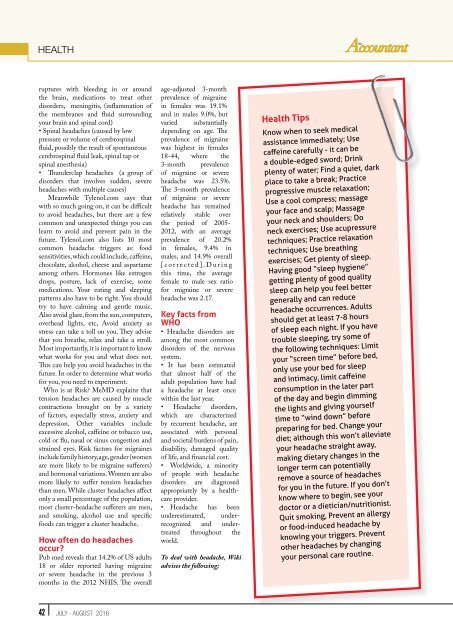The-Accountant-Jul-Aug-2016
Create successful ePaper yourself
Turn your PDF publications into a flip-book with our unique Google optimized e-Paper software.
HEALTH<br />
ruptures with bleeding in or around<br />
the brain, medications to treat other<br />
disorders, meningitis, (inflammation of<br />
the membranes and fluid surrounding<br />
your brain and spinal cord)<br />
• Spinal headaches (caused by low<br />
pressure or volume of cerebrospinal<br />
fluid, possibly the result of spontaneous<br />
cerebrospinal fluid leak, spinal tap or<br />
spinal anesthesia)<br />
• Thunderclap headaches (a group of<br />
disorders that involves sudden, severe<br />
headaches with multiple causes)<br />
Meanwhile Tylenol.com says that<br />
with so much going on, it can be difficult<br />
to avoid headaches, but there are a few<br />
common and unexpected things you can<br />
learn to avoid and prevent pain in the<br />
future. Tylenol.com also lists 10 most<br />
common headache triggers as: food<br />
sensitivities, which could include, caffeine,<br />
chocolate, alcohol, cheese and aspartame<br />
among others. Hormones like estrogen<br />
drops, posture, lack of exercise, some<br />
medications. Your eating and sleeping<br />
patterns also have to be right. You should<br />
try to have calming and gentle music.<br />
Also avoid glare, from the sun, computers,<br />
overhead lights, etc, Avoid anxiety as<br />
stress can take a toll on you. <strong>The</strong>y advise<br />
that you breathe, relax and take a stroll.<br />
Most importantly, it is important to know<br />
what works for you and what does not.<br />
This can help you avoid headaches in the<br />
future. In order to determine what works<br />
for you, you need to experiment.<br />
Who is at Risk? MeMD explains that<br />
tension headaches are caused by muscle<br />
contractions brought on by a variety<br />
of factors, especially stress, anxiety and<br />
depression. Other variables include<br />
excessive alcohol, caffeine or tobacco use,<br />
cold or flu, nasal or sinus congestion and<br />
strained eyes. Risk factors for migraines<br />
include family history, age, gender (women<br />
are more likely to be migraine sufferers)<br />
and hormonal variations. Women are also<br />
more likely to suffer tension headaches<br />
than men. While cluster headaches affect<br />
only a small percentage of the population,<br />
most cluster-headache sufferers are men,<br />
and smoking, alcohol use and specific<br />
foods can trigger a cluster headache.<br />
How often do headaches<br />
occur?<br />
Pub med reveals that 14.2% of US adults<br />
18 or older reported having migraine<br />
or severe headache in the previous 3<br />
months in the 2012 NHIS. <strong>The</strong> overall<br />
age-adjusted 3-month<br />
prevalence of migraine<br />
in females was 19.1%<br />
and in males 9.0%, but<br />
varied substantially<br />
depending on age. <strong>The</strong><br />
prevalence of migraine<br />
was highest in females<br />
18-44, where the<br />
3-month prevalence<br />
of migraine or severe<br />
headache was 23.5%.<br />
<strong>The</strong> 3-month prevalence<br />
of migraine or severe<br />
headache has remained<br />
relatively stable over<br />
the period of 2005-<br />
2012, with an average<br />
prevalence of 20.2%<br />
in females, 9.4% in<br />
males, and 14.9% overall<br />
[corrected].During<br />
this time, the average<br />
female to male sex ratio<br />
for migraine or severe<br />
headache was 2.17.<br />
Key facts from<br />
WHO<br />
• Headache disorders are<br />
among the most common<br />
disorders of the nervous<br />
system.<br />
• It has been estimated<br />
that almost half of the<br />
adult population have had<br />
a headache at least once<br />
within the last year.<br />
• Headache disorders,<br />
which are characterized<br />
by recurrent headache, are<br />
associated with personal<br />
and societal burdens of pain,<br />
disability, damaged quality<br />
of life, and financial cost.<br />
• Worldwide, a minority<br />
of people with headache<br />
disorders are diagnosed<br />
appropriately by a healthcare<br />
provider.<br />
• Headache has been<br />
underestimated, underrecognized<br />
and undertreated<br />
throughout the<br />
world.<br />
To deal with headache, Wiki<br />
advises the following;<br />
Health Tips<br />
Know when to seek medical<br />
assistance immediately; Use<br />
caffeine carefully - it can be<br />
a double-edged sword; Drink<br />
plenty of water; Find a quiet, dark<br />
place to take a break; Practice<br />
progressive muscle relaxation;<br />
Use a cool compress; massage<br />
your face and scalp; Massage<br />
your neck and shoulders; Do<br />
neck exercises; Use acupressure<br />
techniques; Practice relaxation<br />
techniques; Use breathing<br />
exercises; Get plenty of sleep.<br />
Having good “sleep hygiene”<br />
getting plenty of good quality<br />
sleep can help you feel better<br />
generally and can reduce<br />
headache occurrences. Adults<br />
should get at least 7-8 hours<br />
of sleep each night. If you have<br />
trouble sleeping, try some of<br />
the following techniques: Limit<br />
your “screen time” before bed,<br />
only use your bed for sleep<br />
and intimacy, limit caffeine<br />
consumption in the later part<br />
of the day and begin dimming<br />
the lights and giving yourself<br />
time to “wind down” before<br />
preparing for bed. Change your<br />
diet; although this won’t alleviate<br />
your headache straight away,<br />
making dietary changes in the<br />
longer term can potentially<br />
remove a source of headaches<br />
for you in the future. If you don’t<br />
know where to begin, see your<br />
doctor or a dietician/nutritionist.<br />
Quit smoking, Prevent an allergy<br />
or food-induced headache by<br />
knowing your triggers. Prevent<br />
other headaches by changing<br />
your personal care routine.<br />
42 JULY - AUGUST <strong>2016</strong>

















